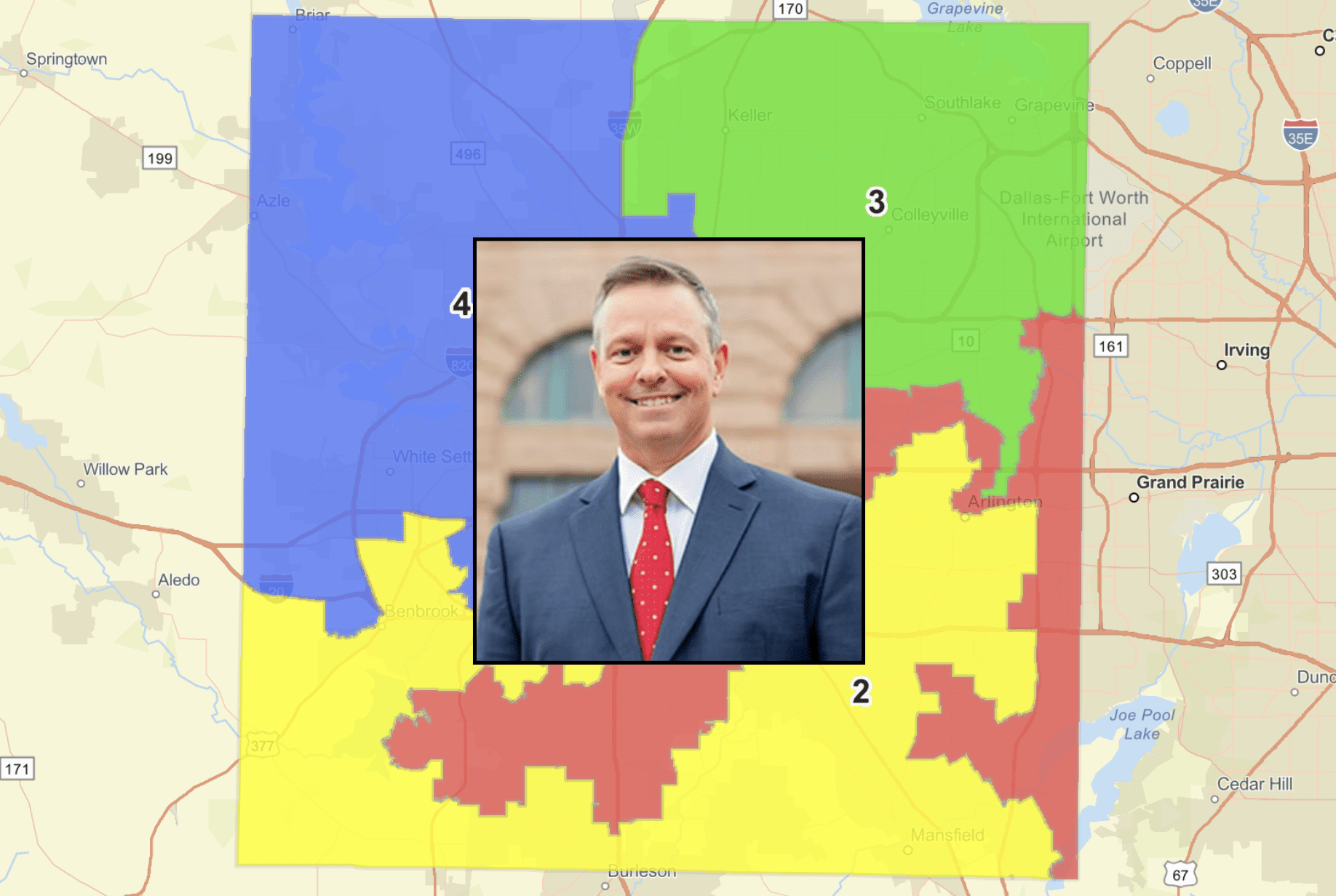A federal judge in Fort Worth declined to block a new Tarrant County Commissioners Court map drawn to increase Republicans’ partisan advantage, concluding that Democrats are unlikely to succeed on the merits of any of their claims alleging racial discrimination.
Chief District Judge Reed O’Connor issued an opinion on Friday denying Democrats’ motion for a preliminary injunction, which would have blocked the Republican map from taking effect while the case is litigated.
Democrats filed an appeal on Monday to the U.S. Fifth Circuit.
Background
In June, Tarrant County’s Republican-majority commissioners court approved a redistricting plan designed to increase the party’s representation on the five-member governing body from 3-2 to 4-1 starting with the 2026 elections.
Democrats promptly sued, claiming that the new commissioner precinct boundaries were racially gerrymandered to eliminate one of the two existing majority-minority precincts in violation of the Voting Rights Act and the U.S. Constitution.
Plaintiffs are minority voters who were moved either from majority-minority into majority-Anglo precincts or from precincts that will vote for new commissioners in 2026 to precincts next on the ballot in 2028.
They are represented by attorney Chad Dunn, who served as general counsel to the Texas Democrats for two decades until resigning in March.
Dunn alleged that the redistricting disproportionately impacts and dilutes the votes of black and Latino voters.
Tarrant County then moved to dismiss Democrats’ challenge, defending the map as a permissible partisan gerrymander.
Commissioner districts had not been redrawn since 2011. Under a previous administration, the county declined to draw new precincts following the 2020 census.
Attorneys with Public Interest Legal Foundation—who are representing Tarrant County, commissioners court, and County Judge Tim O’Hare—contend that because county officials followed the advice of legal counsel to preserve a majority-minority district, they ended up with a “constitutionally suspect” map in 2021.
“As Justice Thomas has argued, far from ameliorating concerns about discrimination, the requirement of majority-minority districts creates constitutional concerns,” wrote O’Connor in his opinion.
Opinion
Judge O’Connor dismantled Democrats’ intentional racial vote-dilution claims, noting that they failed to “disentangle” race and partisan politics.
The Supreme Court has said that to prevail on a racial gerrymandering claim “when race and partisan preference are highly correlated,” the plaintiff “must disentangle race and politics if it wishes to prove that the legislature was motivated by race as opposed to partisanship.”
“Otherwise, a court has no authority to question a plausible case of partisan gerrymandering,” wrote O’Connor.
O’Connor’s opinion noted that:
- Not every redistricting gives rise to a “discriminatory effect of constitutional dimensions,” even if it appears that way under a disparate impact test.
- None of the plaintiffs’ evidence suggesting a history of discriminatory intent is persuasive.
- Mid-decade redistricting is not “exceedingly unusual,” as explained in an amicus brief filed by the State of Texas.
- The alleged rushed timeline, lack of community input, and failure to secure outside counsel in the usual manner are “at most indicators of politics—not race discrimination.”
No “Smoking Gun” of Discrimination
The judge also wrote that the plaintiffs presented no evidence of legislative history for the court to consider, but instead highlighted “one piece of evidence, which they believe is direct evidence of discriminatory intent”—a television interview on the day the new map was approved in which O’Hare was asked about the impact redistricting would have on minority voters and responded:
The policies of Democrats continue to fail black people over and over and over, but many of them keep voting them in. It’s time for people of all races to understand the Democrats are a lost party, they are a radical party, it’s time for them to get on board with us and we’ll welcome them with open arms.
“This statement is not the smoking gun Plaintiffs think it is,” wrote O’Connor.
Judge O’Hare was prompted by a reporter to answer a racially charged question. His answer observes the correlation between race and partisan preference, which is consistent with Plaintiffs’ own evidence that racial minorities vote cohesively. Plaintiffs cannot now suggest Judge O’Hare was making an unfair racial assumption, when the very same assumption underlies Plaintiffs’ claims.
The second half of the statement is addressed to “people of all races” to “get on board” with the Republican party. All this indicates is that Judge O’Hare wants to garner more Republican support. This expressly partisan motive conforms with what Defendants have represented all along in their briefing.
“Given the dearth of evidence on this record to support a finding of discriminatory intent, the Court concludes that Plaintiffs fail to demonstrate a likelihood of success on the merits of their intentional racial vote-dilution claims,” wrote O’Connor.
“Because Plaintiffs do not demonstrate a likelihood of success on the merits of any of their claims, the Court does not address the other considerations for a preliminary injunction.”
The judge also dismissed Democrats’ First Amendment claims against the redrawn district boundaries.
O’Connor did agree to expedite the proceedings as requested by the plaintiffs, but for now the Democrats have placed their request for a preliminary injunction in the hands of the U.S. Fifth Circuit Court of Appeals.
Meanwhile, the Republicans’ new Tarrant County Commissioners Court map remains in effect for the upcoming 2026 elections. Candidate filing for the March 3, 2026, primary begins November 8.
Additional information can be found on the Tarrant County Redistricting website.
No ads. No paywalls. No government grants. No corporate masters.
Just real news for real Texans.
Support Texas Scorecard to keep it that way!





